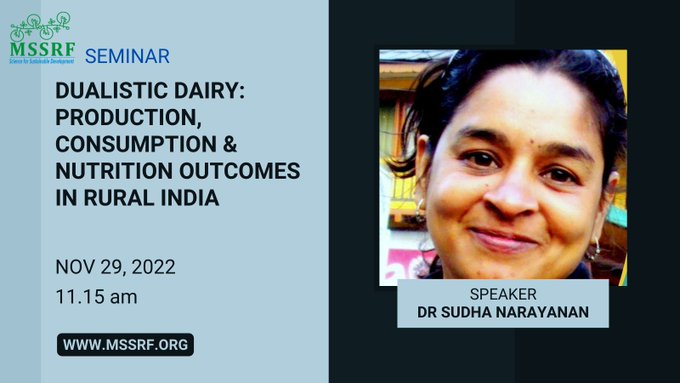You are cordially invited to the seminar by Dr Sudha Narayanan, Research Fellow, IFPRI South Asia, on Dualistic Dairy: Production, consumption and nutrition outcomes in rural India, a paper coauthored with Digvijay Singh Negi and Tanu Gupta, at Sambasivan Auditorium, on Tuesday November 29, 2022.

You can also join online via the zoom link:
https://us06web.zoom.us/j/86862082999?pwd=YzNSM0pYM3RWME14cEtWTGxlZERRQT09
Meeting ID: 868 6208 2999
Passcode: 695443
Presentation Title: Dualistic Dairy: Production, consumption and nutrition outcomes in rural India, a paper coauthored with Digvijay Singh Negi and Tanu Gupta.
Abstract: There is growing empirical evidence that household production influences consumption and nutrition, but also that this linkage weakens with access to markets. Yet, existing literature on the mediating role of markets in the relationship between production and consumption often fails to distinguish between different types of markets, choosing instead to define market access typically in terms of distance. In this paper, we distinguish local milk markets from organized dairy value chains that are geared towards supplying distant consumers. Our paper posits that the segmentation of milk markets in rural India between organized value chains and informal local markets complicates the relationship between household-level milk production and consumption and nutritional outcomes for children. Our analysis of a rich panel data set from 30 villages in eight states in rural India leads us to six key conclusions. First, milk consumption is not separable from production and that while markets play a role in consumption smoothing they are not a complete substitute for household production. Second, the relationship between household consumption and production is weaker for large landowners and those with larger herd sizes. Third, a large presence of organized milk buyers in a village is associated with lower milk consumption of dairy cow-owning households, overturning the positive association of participation in organized value chains with household milk consumption. Fourth, dairy producing households consume relatively less in value terms of other food items and more on milk only when the possibilities of selling milk to possibly more profitable channels are limited as compared to when such opportunities abound. We also find some evidence that the share of village milk sales to formal channels is inversely correlated with children’s height-for-age and weight-for-age scores and positively correlated with the prevalence of stunting in children in dairying households. Fifth, contrary to expectations, for households that do not own dairy animals, the presence of organized value chains remains uncorrelated with milk consumption, dairy share of consumption, and with nutritional outcomes of children. Sixth, we infer, test for and find suggestive evidence of dual milk markets; i.e., different types of households (those not owning dairy animals, small landowners and net buyers vis-à-vis dairy animal owning households, large landowners and net sellers) participate in different milk markets that do not interact with each other. Our study suggests that market structure can have a bearing on the relationship between production and consumption; it is also important to evaluate spill overs and general equilibrium effects associated with the structure of markets while framing market development interventions that are purported to be nutrition-sensitive.
About the Speaker: Dr Sudha Narayanan is currently a Research Fellow at the International Food Policy Research Institute (IFPRI), South Asia Region, based in Delhi, on leave from the Indira Gandhi Institute of Development Research in Mumbai, where is an Associate Professor. She is an agricultural economist by training and works on agricultural markets, trade, institutions, food and nutrition policy and social protection in India.

